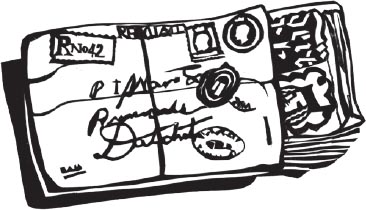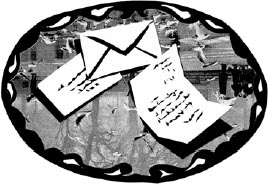5
A Bundle of German Marks

The wad of notes turned up in the steamer trunk with MCC stickers which stood in the garage, covered in spiders’ webs and filled with memorabilia of Plum’s cricketing triumphs, of the tours to Australia when he brought back the Ashes – the first time, in 1903–4, and then again, in 1911–12, though on that tour he became too ill to play. The packet is bulky, the notes squeezed into a strong envelope, made of paper stiffened by fibre, and addressed to P.F. Warner, Esq. It’s registered, with blue pencil streaks pretending to be string and a crusty wax scarlet seal – a trace of the blood pact, memories of battles won, like the frogging on Hussars’ uniform, those decorative mementoes of victims’ bones. The envelope has been opened at some point, but the notes inside are pristine: 41,000 German marks in denominations of 100, printed in 1920 in Berlin with on one side the Bamberg Rider in his Prince Valiant hairdo contemplating his own mirror image. The following year, 1921, according to several postmarks, my grandfather’s bank manager informed him he would be deducting £10 from his account for the purchase he had ordered.
The wad of cash from Weimar has a desolate, orphaned air: that wild inflation that sped the German government’s collapse, Hitler’s rise, the annexation of the Sudetenland, Kristallnacht, the invasion of Belgium, the defeat of France, and on and on to the end of Palestine and to so many other ills that plague the world today – this loss of value was well under way, until you needed absurd heaps of those same notes to buy a needle and thread.
There can never have come that moment for trading them in for sterling or Egyptian pounds at a favourable rate. I remember in Phnom Penh, after the regime fell, the banknotes with Pol Pot’s portrait were being used as scrap paper, to twist around a dozen joss sticks, a bunch of lemon grass, a peck of black tea. Online now, in the flourishing market in antique banknotes, this stash of post-First World War marks is still worthless.
Neither Plum nor my father had sound hunches.
![]()
Many of Esmond’s letters to his father, during the campaign in North Africa, ask Plum to buy this currency or that and it seemed that such speculation was a bond between them, spurred on in part by m’tutor, C.M. (Cyril Mowbray) Wells, who offered tips for stocks and shares, bonds and bills on a regular basis. Wells, who was born in 1871, played rugby for England from 1892 to 1897 and cricket at county level under Plum as his captain, could recite by heart the Odes of Horace and even the whole of Paradise Lost – or so it was said – spent over thirty years as a housemaster at Eton and taught classics there, especially that rarefied skill, Greek prose and verse composition. If he liked a line someone produced, he’d reach into a pocket, saying ‘Have a small diamond’ and hand the boy something – something imaginary.
Wells was one of those Victorian/Edwardian heroic Englishmen of a certain class and background whom we meet in the rolls of the dead in the First World War, but, like Plum, he was too old to fight. After trouble with his knees put an end to his glories on the pitch and in the field, he strove in other spheres: stamp collecting (perhaps remembering Plum’s cricketing youth, he specialised in the Caribbean), connoisseurship of port and wine, and heroic angling – landing what strikes a reader today as shocking piles of the beautiful creatures, hundreds and hundreds of salmon every year on fishing trips to Norway (in the year he turned 80, he caught his eightieth salmon weighing over forty pounds).
The two sportsmen remained very close: he would later bring both Warner boys, Esmond and his brother John, into his house at Eton. After his death in 1963, The Times published a letter from another pupil, who asserted that at Eton, ‘no one in his time had a deeper influence’. It was there my father developed a fatal sense of, and a fatal yearning for, most favoured status.
Lytton Strachey’s barbed portraits of Wells’ contemporaries, Virginia Woolf’s rebellious bitterness against their insouciant privileges, haunt this figure from Esmond’s youth: in 1926 Wells published – privately – an anthology of favourite pieces, rendered into Greek on the opposite page to the original. Suckling, Baudelaire, Tennyson, Shelley are mixed in with cuttings: leaders from The Times, General Blanco’s revanchist manifesto from Havana, an epitaph for Outside Porter’s ‘little collie’ Nellie, and a notice from ‘a morning paper’ – ‘MARY. Waited three hours for you at the appointed place, until questioned by a suspicious policeman. If this is the price of love, it is too heavy a one for me to pay. Good-bye. POTTS.’
The book’s front cover is engraved in gold leaf, with a hexagonal podium set with an octagonal desk, which appears to be lifting off on a sheaf of rays: sacred geometry in flight.
Wells was the family Tiresias. The Eton Ramblers end-of-year newsletter in 1963 remarks that CMW was known as ‘Bummy, affectionately, and for visible reasons’ (I never heard my father call him so).
The Warners were living just downriver from Eton in Datchet, and Esmond’s intensive correspondence begins when he was seven and sent away to board at Stanmore Park:
‘Dear Mother I forgot to say in my leter to ask you for sum jan and fruit. Send sum onginges and aples and sum pares and sum kinds of jam. Lots of love you Esmond’.
The constant flow falters during his time at Eton only because he was seeing his parents every weekend. The letters I’ve inherited start up again from the army’s Staff College at Camberley, two or three times a week before he goes overseas and thereafter even more frequently. Throughout, he keeps passing on Wells’ financial prophecies. Mother Rat was known to like a flutter, but it turns out, which I never suspected, that quiet, trim, soft-spoken Plum was into currency speculation, egged on by Wells. He passed on the habit – the hope? – to his son, for Esmond in his letters home from the desert reports tips from his old tutor from school. In June 1945, m’tutor wrote (the letter had caught up with Esmond in August): ‘I am staying at my flat, wh. is barely habitable owing to enemy action.’
He was, however, enjoying some fine wines laid down before the war. He passed on news of his latest windfall in the currency markets, urging Esmond to buy South African gold as soon as the government allowed it: ‘I think you might buy a few more Blyvoors, & perhaps Crowns. I am only telling you this because I know you’re interested. But if you see a good profit anywhere, take it – in my opinion, though a good broker friend always says, “hang on”. Our expected boomlet has not yet developed.’ He signed off, ‘Cura ut valeas’ (‘Take care that you may flourish’).
One of the obituaries of Wells (in the Salmon and Trout Magazine, May 1964) commented: ‘His sound judgement as an investor enabled him to supplement his salary and later, a very small pension.’
This teacher, born thirty years before Victoria’s reign came to an end, stoked my father’s values, his striving, and his whole outlook. My father went on seeing him throughout Wells’ life and went to his last birthday lunch – his ninety-second: ‘Dinner at UUC, 7 p.m. in ordinaries’, Wells commanded.
![]()
Esmond’s devotion to his old schoolmaster and his institution never diminished. The Latin tags he’d learned from Wells stuck and he pronounced them in the now superseded English way, with W sounds for Vs and the vowels very strange: ‘Odi profanum vulgum et arceo,’ he would declaim. When asked to translate, he told me, with an aggressive chuckle, ‘I loathe the vulgar crowd and I shun them.’ When debutantes stopped being presented at court and a top hat was no longer de rigueur at Royal Ascot, he’d sigh, ‘Eheu fugaces.’ Neither disdain nor melancholy suited him – he was a congenial, sociable man, ‘clubbable’ in his own parlance.
In their last exchange of letters, Esmond is still reminiscing about winning the house colours, which were also there in the trunk in the garage, a heap of ragged silk ribbons. But the bond meant more than friendship: it fastened Esmond to a certain spot, where ‘people like us’ belonged and followed certain pursuits. As in a musical score marked ‘Repeat’, the melodies my father heard as a boy kept him humming happily along, long after the instruments were no longer tuned according to current temperament and the playing style was changing.
